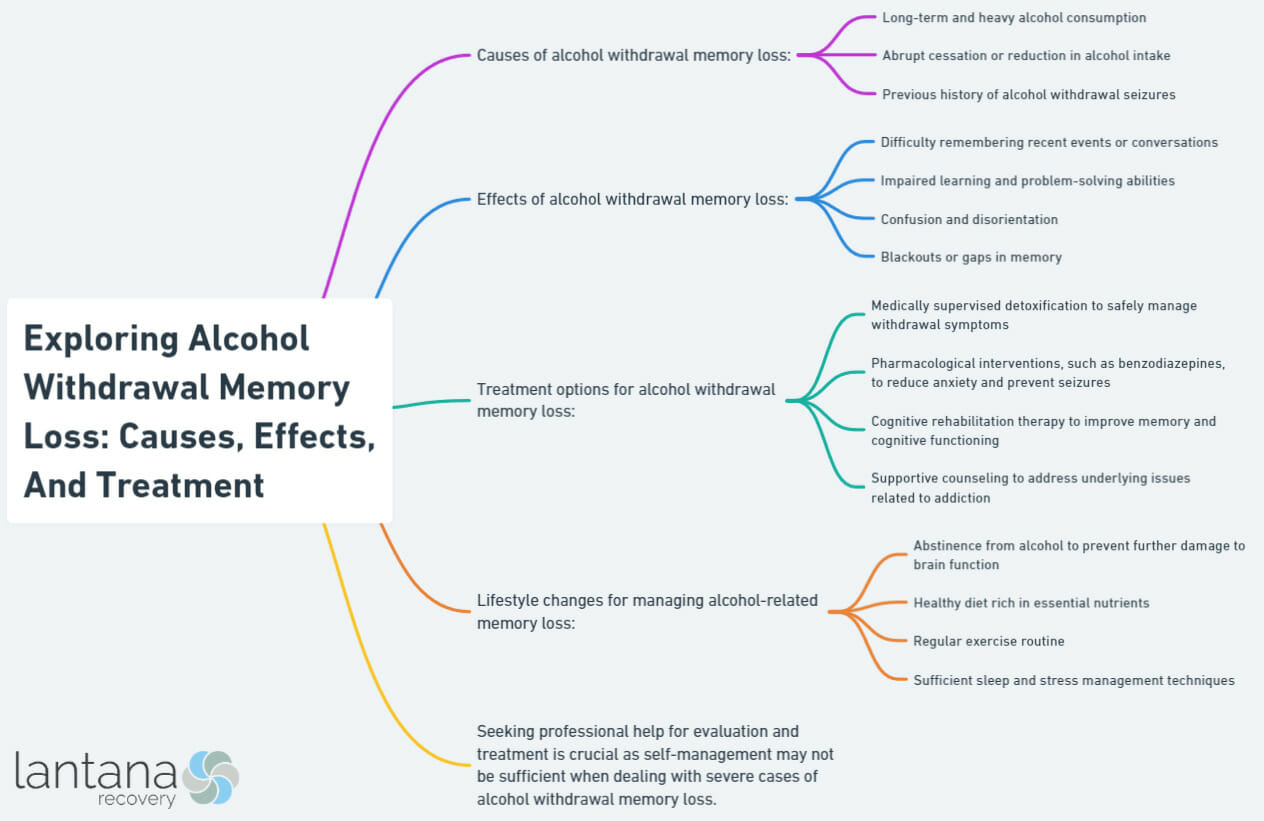Alcohol withdrawal memory loss is a complex and often misunderstood issue that affects countless individuals worldwide. By understanding its causes, effects, and treatment options, we can empower ourselves and our loved ones to make informed decisions and take proactive steps towards a healthier, happier life. In this comprehensive guide, we will explore the connection between alcohol withdrawal and memory loss, delve into the impact of withdrawal on short-term and long-term memory, and discuss prevention strategies to minimize the risk of alcohol-induced cognitive impairments.
Key Takeaways
- Alcohol withdrawal has a direct connection to memory loss, caused by brain chemistry changes, cognitive impairments and sleep disturbances.
- Alcohol withdrawal can cause both short-term and long-term memory impairments with serious consequences such as Wernicke–Korsakoff Syndrome.
- To reduce the risk of alcohol withdrawal memory loss it is important to engage in appropriate lifestyle choices and seek professional help for addiction management, including medical detoxification, psychotherapy or medication assisted treatments.
Alcohol Withdrawal and Memory Loss: The Connection

Alcohol withdrawal, a common consequence of alcohol abuse, can intensify the effects of alcohol on the brain and lead to memory loss. Chronic alcohol consumption alters brain chemistry, particularly affecting the GABAergic system. When an individual ceases alcohol use, these alterations can manifest as withdrawal symptoms, ranging from mild to severe. Memory loss during alcohol withdrawal often arises from a combination of factors, such as changes in brain chemistry, cognitive impairments, and sleep disturbances.
In order to comprehend the link between alcohol withdrawal and memory loss, we need to delve into the specific factors that contribute to this problem. We’ll explore how brain chemistry changes, cognitive impairments, and sleep disturbances during withdrawal impact both short-term and long-term memory.
Brain Chemistry Changes
Alcohol withdrawal is often a result of chronic alcohol misuse, and it leads to changes in neurotransmitters and receptors in the brain, resulting in memory loss and potentially chronic memory disorders. The primary neurotransmitters affected by alcohol withdrawal are GABA and glutamate, which can lead to severe symptoms such as depression. A reduced sensitivity of GABA receptors in the brain is the fundamental cause of alcohol withdrawal syndrome.
During alcohol withdrawal, it’s been observed that the parts of the brain responsible for a neurotransmitter called glutamate become overactive. This overactivity can harm functions like thinking clearly, focusing, and controlling impulsive behavior, suggests a research studying the Glutamatergic hyperfunctioning during alcohol withdrawal syndrome.
Prolonged alcohol intake affects the brain, resulting in modifications to its receptors. This happens to maintain regular brain function. Alcohol has the ability to prevent the excitatory function of the NMDA receptor. This effect is typically seen in humans with mild-moderate alcohol consumption. Long-term alcohol administration results in an adaptive increase in the function of NMDA receptors, which can exacerbate the neurotoxic and seizure-inducing effects of increased glutamate release during withdrawal.
The slowed nerve activity in the hippocampus, a region of the brain responsible for memory formation, is responsible for short-term memory loss during alcohol withdrawal. Excessive alcohol consumption can also increase the destruction of brain cells. Thus, alterations in neurotransmitters and receptors due to alcohol withdrawal play a significant role in memory loss and cognitive impairments.
Cognitive Impairments
Cognitive impairments are another factor contributing to memory loss during alcohol withdrawal. Individuals going through withdrawal often experience short-term memory and executive functioning deficits. Research has demonstrated that binge drinking, a type of alcohol misuse, is associated with heightened impulsivity, disturbed sleep and nightmare due to alcohol withdrawal, lower functioning of spatial working memory, and impaired emotional learning. These effects place individuals in a vulnerable state that can lead to more negative behavior and psychological issues.
Furthermore, studies have demonstrated that moderate-AWS patients had the following characteristics compared to healthy individuals:
- Decreased grey matter volume
- Worse performance in processing speed
- Worse performance in short-term memory
- Worse performance in executive functions
- Worse performance in episodic memory tests.
These cognitive deficits can make the process of alcohol withdrawal more challenging and can exacerbate the memory loss experienced during this time. Mitigating these impairments through therapy and support is a key step in lessening the effects of alcohol withdrawal on memory.
Sleep Disturbances
Sleep disturbances are another factor contributing to memory loss during alcohol withdrawal. Frequent awakening, restless sleep, insomnia, and night terrors are commonly reported by those going through withdrawal. These sleep irregularities can have a significant impact on memory consolidation and recall. Studies have shown that a lower percentage of N3 sleep, also known as slow-wave sleep, is associated with cognitive deficits, including impairments in short-term memory and executive functions, both directly and indirectly through reductions in gray matter volume in individuals with alcohol use disorder.
Moderate-AWS patients have demonstrated non-rapid eye movement sleep alterations when compared to healthy controls. Sleep abnormalities can last multiple months after alcohol cessation and increase the risk of relapse. In the early stages of abstinence, sleep irregularities are detected including:
- Increased sleep latency and fragmentation
- Reduced sleep duration and sleep efficiency
- Decreased percentage of stage 3 (N3) of Non-rapid eye movement (NREM) sleep
Insomnia, a common protracted withdrawal symptom, persists after the acute withdrawal phase of alcohol and may require treatment with magnesium or trazodone.
Mitigating sleep disturbances during alcohol withdrawal is vital for enhancing overall health as well as reducing the effects of withdrawal on memory function. Appropriate sleep hygiene, relaxation techniques, and medical intervention can help alleviate sleep disturbances and improve memory during and after alcohol withdrawal.
“AWS occurs in 8% of hospitalized patients in general hospitals and between 10 and 15% of patients during a programmed detoxification,” reports a research published in Alcohol and Alcoholism. (Alteration of Glutamate/GABA Balance During Acute Alcohol Withdrawal in Emergency Department: A Prospective Analysis, Brousse et al., 2012)
The Impact of Alcohol Withdrawal on Short-Term and Long-Term Memory

Alcohol withdrawal can have a profound impact on both short-term and long-term memory function. Short-term memory loss during withdrawal is characterized by difficulty recalling recent events and information, while long-term memory loss is more severe and can involve permanent impairment. Both types of memory loss share some similar causes, such as changes in brain chemistry and cognitive impairments, but long-term memory loss is often more profound and irreversible.
To delve deeper into the impact of alcohol withdrawal on memory, we will dissect the differences between short-term and long-term memory loss and how these forms of memory impairment can occur during withdrawal.
Short-Term Memory Loss
Short-term memory loss during alcohol withdrawal is a form of cognitive impairment that occurs as a result of ceasing alcohol consumption following a period of heavy drinking. Factors such as genetics, the quantity and rate of alcohol intake, and tolerance levels can affect the degree of memory loss associated with alcohol consumption.
Memory loss during acute withdrawal syndrome can lead to:
- Fear
- Bewilderment
- Depression
- Anxiety
As the illness progresses, chronic memory disorder symptoms become more frequent and erratic.
Short-term memory loss is also associated with blackouts, which occur when a person experiences gaps in their memory while under the influence of alcohol. Blackouts are a result of excessive alcohol consumption in a short period of time and can have a significant impact on an individual’s ability to function and recall recent events.
Addressing short-term memory loss during alcohol withdrawal involves managing withdrawal symptoms, seeking appropriate treatment, and implementing strategies to improve memory function. By grasping the causes and outcomes of short-term memory loss, one can implement measures to lessen its influence on their lives.
Long-Term Memory Loss
Long-term memory loss can result from chronic alcohol misuse and withdrawal. It can lead to impaired memory, decreased concentration, and cognitive difficulties. In extreme cases, alcohol withdrawal may also lead to conditions such as Wernicke-Korsakoff syndrome, which is characterized by profound memory loss and cognitive disability.
Long-term alcohol abuse can have significant repercussions on memory, including permanent impairment due to alcohol related brain damage.
Preventing long-term memory loss requires addressing the underlying causes of alcohol misuse, as well as seeking appropriate treatment and support. By understanding the potential for long-term memory loss resulting from chronic alcohol misuse and withdrawal, one can take preventative actions to reduce the likelihood of developing serious cognitive impairments.
Wernicke-Korsakoff Syndrome: A Severe Consequence of Alcohol Withdrawal

Wernicke Korsakoff-Korsakoff. Syndrome is a severe cognitive disorder related to thiamine deficiency during alcohol withdrawal. This neurological condition is characterized by severe memory loss and cognitive impairment and typically occurs during alcohol withdrawal. If left untreated, Wernicke-Korsakoff Syndrome can result in dementia and can even be fatal. Early detection and treatment are crucial in preventing the progression of this condition and reducing the likelihood of long-term memory loss.
In order to better comprehend Wernicke-Korsakoff Syndrome, we need to investigate the role of thiamine deficiency in the manifestation of this condition and delve into its symptoms and progression.
Thiamine Deficiency
Thiamine deficiency is a long-term consequence of alcohol consumption on the brain that is associated with metabolism. Up to 80% of alcoholics have a thiamine deficiency, and alcoholics are more prone to thiamine deficiency due to inflammation in the GI tract impairing nutrient absorption and inadequate diet, according to a research published in Alcohol Research and Health by scientists from Vanderbilt University, Nashville. Signs of thiamine deficiency may include cognitive dysfunction, disorientation, amnesia, and alterations in vision.
A banana bag is a multivitamin preparation that contains adequate amounts of thiamine, folic acid, and other essential nutrients. It is administered intravenously during alcohol withdrawal to reduce the risk of developing Wernicke syndrome. Thiamine can also be obtained through dietary sources such as fish, seafood, pork, tofu, nuts, beans, brown rice, green peas, and asparagus, as well as through supplements and intravenous administration.
Addressing thiamine deficiency is crucial in preventing the development of Wernicke-Korsakoff Syndrome and reducing the risk of long-term memory loss. By ensuring proper thiamine intake and seeking appropriate treatment, individuals can minimize the impact of alcohol withdrawal on cognitive function and overall well-being.
Symptoms and Progression
Symptoms of Wernicke-Korsakoff Syndrome include:
- Severe amnesia for past events
- Impaired ability to commit current experience to memory
- Progression to Korsakoff’s dementia, which is not reversible
- Stupor, coma, and eventually death in untreated cases
Early detection and treatment of Wernicke-Korsakoff Syndrome can help impede the advancement of the condition and reduce the possibility of long-term memory loss. By recognizing the symptoms and seeking prompt medical attention, individuals can minimize the impact of this severe cognitive disorder on their lives.
Treatment Options for Alcohol-Induced Memory Loss

There are various treatment options available for individuals experiencing alcohol-induced memory loss, including medical detox, psychotherapy, and medication-assisted treatments. These treatments aim to address the underlying causes of alcohol misuse and withdrawal, reduce the impact of cognitive impairments, and improve overall well-being. By understanding the available treatment options, individuals can make informed decisions about the best course of action for their unique situation.
Through clinical and experimental research, we will investigate the various treatment options for alcohol-induced memory loss and how they can assist individuals on their path to recovery.
Medical Detox
Medical detox is a process that involves the supervised withdrawal from drugs or alcohol in a safe and controlled environment, often the first step in addiction treatment. Healthcare professionals provide support and medication to alleviate withdrawal symptoms and ensure the safety and comfort of the individual undergoing detox. Medical detox facilitates the management of alcohol withdrawal symptoms and diminishes memory loss.
In cases of severe symptoms, inpatient care may be necessary for acute alcohol withdrawal syndrome. For individuals with milder symptoms, treatment for alcohol withdrawal syndrome can be received in a home setting. However, medical detox can be hazardous if not carried out under the guidance of a healthcare professional and can cause withdrawal symptoms that can be challenging to manage without medical assistance.
Medical detox is an important step in the treatment of alcohol-induced memory loss. It helps individuals by:
- Managing the physical and psychological symptoms of withdrawal
- Decreasing the probability of relapse
- Furnishing a secure and comfortable atmosphere for recovery.
Psychotherapy
Psychotherapy can play a significant role in addressing the underlying causes of alcohol misuse and improving memory function. It can assist individuals in identifying and addressing the underlying causes of their alcohol misuse, as well as facilitate the development of healthier coping strategies and a support system to help sustain sobriety. Cognitive impairments associated with alcohol withdrawal can include memory loss, difficulty concentrating, and impaired decision-making.
Psychotherapy can provide strategies such as employing mnemonic devices, practicing mindfulness, and engaging in regular physical activity to improve memory function. By incorporating psychotherapy into one’s treatment plan, individuals can develop the skills and support necessary to achieve an alcohol-free lifestyle and mitigate the impact of alcohol withdrawal on memory function.
Medication-Assisted Treatments
Medication-assisted treatments can be a valuable tool in managing alcohol withdrawal symptoms and promoting cognitive recovery. Benzodiazepines, such as Ativan, Librium, and Valium, may be used to mitigate withdrawal symptoms and avert alcohol withdrawal seizures. However, benzodiazepines are not without their risks, and their use should be closely monitored by a healthcare professional.
Anticonvulsants, such as topiramate and pregabalin, have been suggested as potential treatments for alcohol withdrawal syndrome, but the evidence supporting their use over benzodiazepines is not well-established. Gabapentin is not advised for use in severe alcohol withdrawal.
Medication-assisted treatments can help individuals manage the challenges of alcohol withdrawal and promote cognitive recovery. By working closely with a healthcare professional, individuals can determine the most appropriate medication regimen for their unique situation and recovery goals.
Prevention Strategies for Alcohol Withdrawal Memory Loss

Preventing alcohol withdrawal memory loss requires a multifaceted approach, targeting both the underlying causes of alcohol misuse and the factors that contribute to memory loss during withdrawal. By maintaining a brain-healthy lifestyle, seeking professional help, and managing stress, individuals can minimize the risk of alcohol-induced cognitive impairments and lead a healthier, happier life.
We will investigate a number of practical tips and strategies for preventing alcohol withdrawal memory loss and promoting overall brain health.
Brain-Healthy Lifestyle
A brain-healthy lifestyle involves:
- Engaging in regular exercise
- Maintaining social connections
- Stimulating the mind
- Optimizing dietary intake
- Achieving adequate sleep
- Safeguarding the head
- Attending to mental health needs
- Cultivating social networks
Regular exercise has been shown to improve cognitive function, reduce stress, and improve overall physical health, as well as being associated with a reduced risk of developing certain diseases, such as Alzheimer’s and dementia.
Remaining socially engaged can assist in the reduction of stress, betterment of mental health, and augmentation of cognitive function, possibly reducing the likelihood of developing certain illnesses, such as Alzheimer’s and dementia. Obtaining mental stimulation can assist in enhancing cognitive capabilities, abating stress, and improving overall mental wellbeing, also helping decrease the likelihood of developing certain illnesses, such as Alzheimer’s and dementia.
By incorporating these brain-healthy habits into one’s daily routine, individuals can bolster brain health, improve overall well-being, and reduce the risk of alcohol withdrawal memory loss.
Seeking Professional Help
The importance of seeking professional help for alcohol misuse and withdrawal management cannot be overstated. Recognizing that there is an issue is the initial and paramount step in resolving alcohol misuse and withdrawal. Seeking treatment for alcohol misuse can help improve one’s life significantly.
Professional help can come in various forms, such as therapy, support groups, and medical intervention. By seeking the appropriate level of professional help, individuals can gain the tools and resources necessary to overcome alcohol misuse, alcohol addiction, and withdrawal, and prevent alcohol-induced memory loss.
It’s also important to be aware that the alcohol withdrawal timeline can vary from person to person, with symptoms typically starting within hours to a few days after the last drink and peaking within the first week.
Stress Management
Stress management is a key component in reducing the risk of alcohol withdrawal memory loss, as it can help minimize the amount of stress in one’s life. Stress can lead to increased alcohol consumption, which can ultimately result in memory loss. Therefore, stress management is critical in preventing alcohol withdrawal memory loss.
Some effective stress management techniques include deep breathing, progressive muscle relaxation, yoga, and meditation. Other strategies for managing stress include identifying the sources of stress, establishing beneficial coping mechanisms, and utilizing relaxation techniques to bolster overall well-being.
By incorporating stress management techniques into their daily routine, individuals can reduce the likelihood of alcohol withdrawal memory loss and improve their overall quality of life.

Summary
In conclusion, alcohol withdrawal memory loss is a multifaceted issue with significant consequences for individuals and their loved ones. By understanding the connection between alcohol withdrawal and memory loss, recognizing the impact of withdrawal on short-term and long-term memory, and employing prevention strategies and treatments, individuals can take proactive steps towards a healthier, happier life. With knowledge, support, and determination, it is possible to overcome the challenges of alcohol withdrawal memory loss and emerge stronger and more resilient.
Frequently Asked Questions
Is memory loss a withdrawal symptom?
Memory loss is a symptom of alcohol withdrawal and should be taken seriously as it is a warning that a person is going through withdrawal.
What happens to your memory when you stop drinking?
Quitting alcohol can lead to improved brain functioning, with attention, memory and reaction time all improving over time.
However, it may take some time before these are back to their normal levels.
Is memory loss from alcohol reversible?
If a person stops drinking alcohol and receives good support, they may be able to make a partial or full recovery of their memory and thinking skills.
The cells in the brain return to their normal volume over several weeks, which can reduce symptoms such as memory loss, difficulty concentrating, and impulsiveness.









